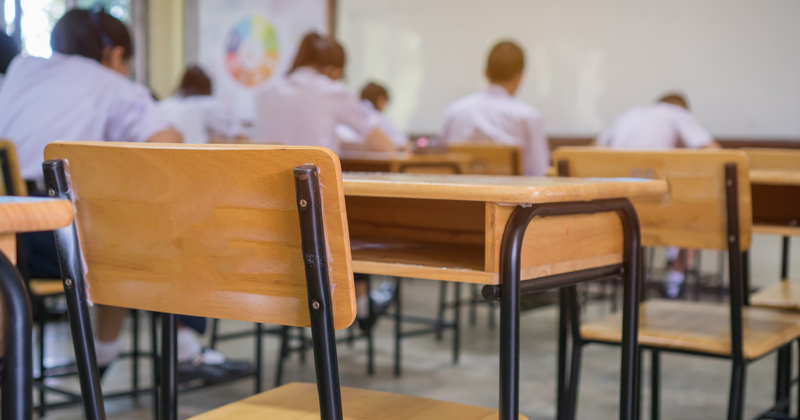Ofsted wants GPs and pharmacies to help schools combat an “overly risk-averse approach” from parents to “keeping children out of school” amid stubbornly-high absence rates.
The watchdog told the Education Committee’s persistent absence and support for disadvantaged pupils inquiry that schools were still facing many of the “new challenges” to attendance following the pandemic.
This included a “propensity” among parents “to keep children home for any illness”, as well as keeping children off school “unnecessarily because of proximity to Covid”.
“These factors…have blurred the boundary of what level of intervention is needed for absence,” Ofsted said in evidence submitted in February and published on Tuesday.
“An important conversation needs to be had, including with the medical profession (especially GPs and pharmacies), about how to help parents get the right perspective and balance, and avoid an overly risk-averse approach to keeping children out of school.”
MPs launched an inquiry to investigate absence from school and support for disadvantaged pupils back in January.
Official statistics show persistent absenteeism soared in the wake of the pandemic.
In the years before Covid, school absence hovered around 4.7 per cent. But it rose to 7.5 per cent last year, according to Department for Education (DfE) data.
Persistent absenteeism – where pupils miss 10 per cent or more classes – has more than doubled, rising from 10.9 per cent in 2018-19, to 22.5 per cent last year.
In research on tackling the issue last year, Ofsted outlined what it defined as new challenges that emerged from autumn 2021 – the first full school year after lockdowns.
This included higher-than-usual numbers of pupils with non-Covid-related illnesses and parents keeping children home unnecessarily because of proximity to Covid, such as a relative testing positive.
Ofsted said in its evidence that since such issues emerged, it had seen “several successful strategies” to tackle them by schools.
These included “communicating” high expectations for attendance to families, reassuring anxious parents and providing practical help such as arranging transport.
Rising rates of persistent absence have been blamed on a range of factors.
They include more relaxed attitudes among parents since lockdowns, worsening mental health among children and the cost-of-living crisis, with some families unable to pay for lunches and daily bus fares.
The DfE is currently setting up new “sector-led” school attendance hubs to offer free support on absence.
It follows a pilot hub launched last year which it said saw “some participating schools achieve significant reductions in their absence and persistent absence rates”.















A really concerning article, which completely overlooked the fact that tens of thousands of children have been, or still are, significantly affected by Long Covid, and a greater number are in families including vulnerable or highly vulnerable relatives. Schools are no longer encouraged to make any major mitigations to reduce viral spread.
So, instead of focusing on creating safer environments for children’s and their families through ventilation, filtration, testing, and better access to online provision, Ofsted are supporting the government in brushing Covid under the carpet, while gaslighting and blaming suffering families.
So this, Rupert Higham.
Covid is running rife through schools. 62,000 UK children now have long covid and approx 180 UK children have died from covid. Multiple medical papers show covid causes long-term health problems, even if the initial infection symptoms in the child were mild. So many parents shouting about putting the air filters in schools to reduce transmission, but are being ignored or threatened. Ofsted are absolute gouls to bully and criticise parents raising the alarm about the long-term effects of mass infection of children with covid. Where is the school’s responsibility for safeguarding the children going to kick in? they always go on about that when it suits them, but children are actively being harmed by this, they know they are supposed to have air filters in place. They know many parents who have been vocal about this have been forced to deregister after being bullied by the school + LA. for pointing out a safeguarding concern at the school! the whole situation stinks!
We are home-educating and my child won’t be going anywhere near a school while this situation remains.
Need to tackle the parents who pull their children out of school for holidays. Perhaps I should take 2 weeks off in the middle of term time and let parents look after their kids for those two weeks?
I partly agree. But what about where parents take children out for 1-2 days at the end of terms 1 or 3 (I acknowledge you said ‘middle of term’)? Schools that I know of are fining for this, yet are not delivering taught curriculum at these times.
This article lacks balance. With 62000 children currently having long covid being aware of the risk levels of long covid can be deemed as an appropriate reaction. Private schools and wealthy institutions in the UK are installing air cleaning devices. Layers of mitigations are available that would reduce further excess disability. Responsible risk assessment and public health work could lead to these measures becoming accepted by all. Given the cost of staff sickness, childcare and disability the financial costs of such mitigations are very low. My concern is people’s resistance to them may be coming from a poor understanding of how disability impacts livelihood and quality of life (ableism) and or a lack if value for self. Valuing our lives and our health is a positive behaviour that should be encouraged.